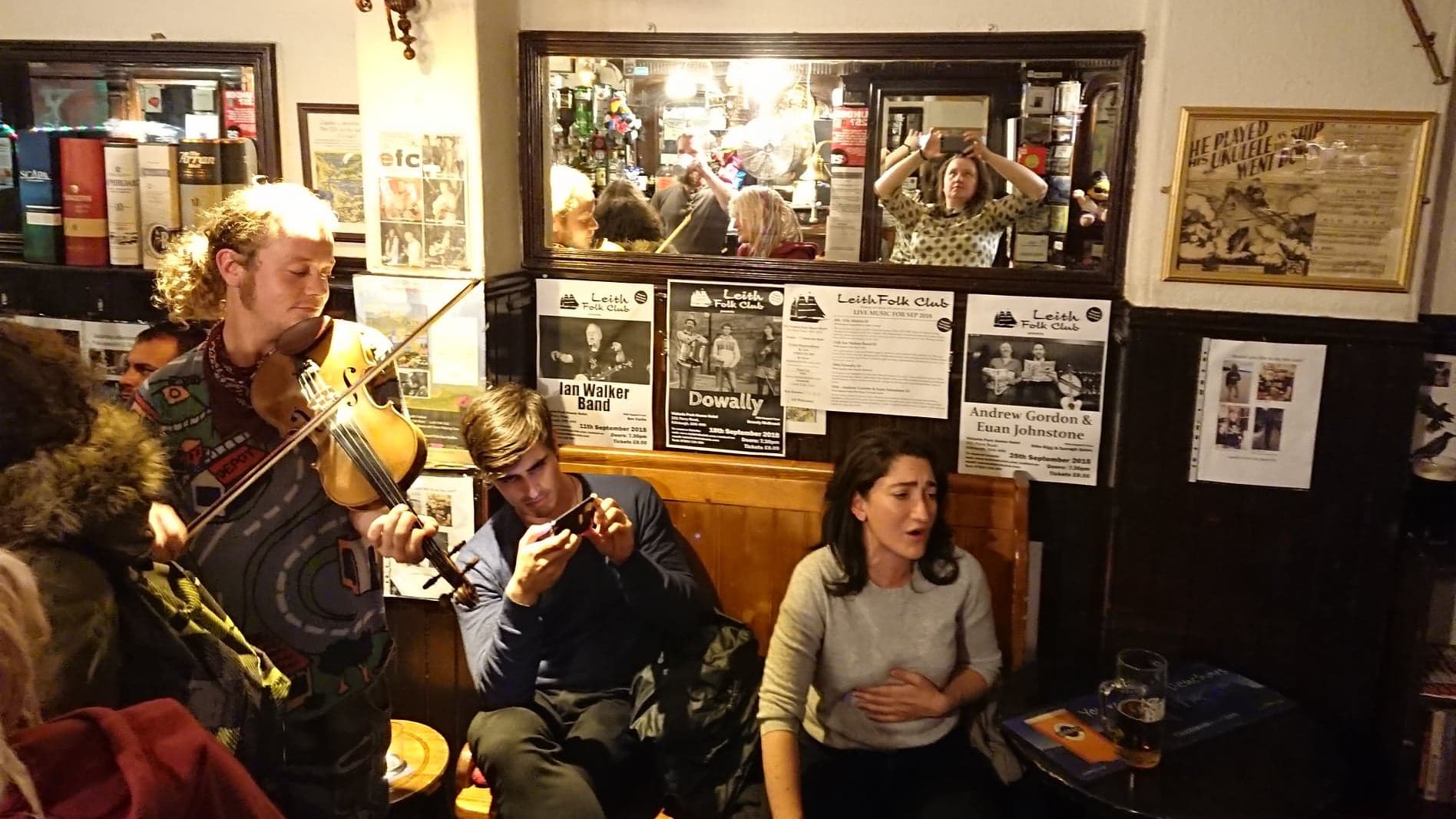When I moved to Edinburgh, Scotland in June of 2018, I was hoping to hide and heal. I had just graduated Yale University with two MAs in humanities and social science research, and was heading for a PhD. But I found I wasn’t going to be an academic. I was internally falling apart. For thirty years, I had suppressed and hidden that I was queer. The burden of performing straightness for so long had left me with a tattered identity. I had no internal character, no knowledge of myself to guide me through this difficult time.
I didn’t have any applicable skills for the outside world. I had two fancy degrees, an enormous amount of debt and, as the daughter of two artists, I had very little financial security. Furthermore, I felt ashamed, convinced I’d failed my family.
I had lacked the language to express myself in simple terms, short sentences. How could I say that I couldn’t choose between loving boys or girls? That I was neither straight nor lesbian. That not being able to love someone who existed within the profoundly nuanced and fantastic spectrum between gay, straight, and beyond, baffled me. As a teenager, I could describe my heroes: I wanted to be Vita Sackville-West and cross dress. I wanted to be Orlando, the character Virginia Woolf fashioned out of Vita, and move between male and female. I remember my mother shaking her head and woefully crying, “Keep it simple? Please.”
In first grade I loved a girl named Victoria and a boy named Eric at the same time. When I was 15 and attending Interlochen Arts Camp I swapped uniforms with a boy and when I put his clothes on I felt, right. At 18 I cried in the dressing room of Betsey Johnson while trying on prom dresses. My poor grandmother, confused, helplessly handed me one flounced, pretty thing after another. Each one felt wrong on my body. In my freshman and sophomore years of college I lived with and loved Jenny. We were too scared and too religious to do anything about it, we didn’t even kiss. And when I was 23 I met my partner, J. His dual prettiness and masculinity drew me in.
I convinced myself that I was straight, just confused, going through a phase (many phases) of experimentation. I was being selfish, why should I confound people this way? I buried my feelings and in an attempt to please, to become what is (I thought) desirable—physically, emotionally, academically—a living weathervane, spinning frantically according to the expectations of others.
But by the spring of 2018, my psyche and sense of self were tissue-thin. My adaptability had failed me. My attempts to please had become so extreme that I appeared to be inconsistent, ungrounded, “not serious.” The dual collapse of my future and my sense of self was too much to handle. Depression hit me with full force.
In my last months at Yale, I barely left my dorm except for when I taught a class or went to Shabbat dinner. For those few hours I’d pull it together. But otherwise? I was a wraith. I slinked out of my apartment, taking side alleys and wearing more black than ever. Just so I could avoid interacting with classmates and faculty members, all of whom knew I’d failed too. A classmate who spotted me called out, “Dementor!”
I spent most of my time in bed, hours and hours.
I remember my partner standing over me looking concerned as I scarfed down yet another bag of Smart Delight Cheese Flavored Popcorn (which I had decided was the best and only needed form of fuel in the world, I ordered 200 mini-bags off of Amazon), staring blankly at the screen as I watched, for the second time, the entire series, Star Trek: The Next Generation.
“We need to get you out of here,” he said. “You need to go sort yourself out.”
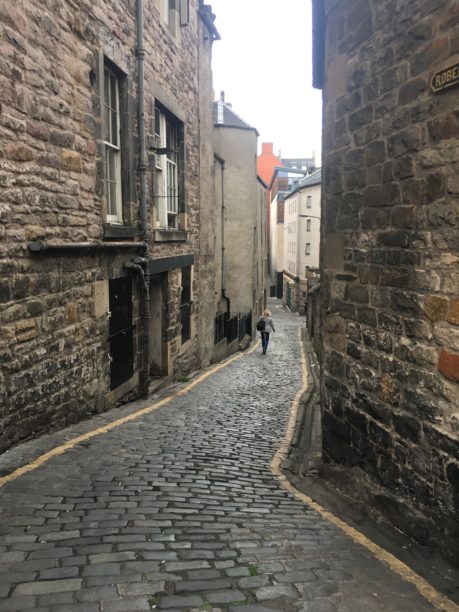
So I moved to Edinburgh, because I didn’t know anyone there and the rent was cheap; for 450 pounds a month, I rented a room in a tiny flat on Dundas Street in the New Town. Every day, I walked for hours in this most walkable of cities. I would march up the hill to Princess Street and cross Waverley Bridge into the Old Town, which dates back to the 12th century and is located on an enormous mound left behind by a moving glacier. At the top of the mound is Edinburgh Castle, connected by the Royal Mile to Holyrood Palace at the bottom. To the west is the New Town, built in the 1760s during the Enlightenment, gorgeous rows of white stone neoclassical buildings; to the east, Holyrood Park and the glorious Arthur’s Seat, a dead volcano. Each day I’d climb the Royal Mile up to Edinburgh Castle and, if I felt like it, make my way down to Holyrood Park. I walked perhaps 10 miles a day.
After two months, my isolation started to wear on me. I began to relish my visits to the cheesemongers, cafés and grocery stores too much. Daily, the poor proprietors were greeted by an overly ecstatic American hungry for conversation. And then one day, on my umpteenth walk through Edinburgh, while strolling down South Bridge, I heard some wild music. Edi is full of folk pubs, and the soft whine of a fiddle or the arrhythmic thump of a bodhran is often heard emanating outside a bar. But this was different. The tune blaring out of The Royal Oak pub round the corner was somewhere between folk and rock. Intermittently I heard whoops and whistles.
The music pulled me in, and once inside I heard for the first time the Auld Reekie String Band playing “The Cuckoo.” I hunched into the corner closest to the door. In between the Auld Reekie’s songs, Scottish locals stood up and sang; a woman with silver-purple hair with a heartrending “He Fades Away,” and an older fella, “The Night Visiting Song.” Each voice told a story I never heard before. I stayed for two hours, and was hooked.
Suddenly the banjo player stood up and declared, in his Cumbrian accent, “This is an open session, anyone who wants to sing can!”
I blurted out, “Do you know ‘Wayfaring Stranger’?”
“Could you hum the tune for me?”
I hummed the first verse. As I made the sound, felt my lungs expand and pump the wind through my vocal chords, I felt something release inside me. I hadn’t made a musical sound in years. And yet, here I was, randomly doing this in a pub full of strangers. I felt a tiny rush of energy.
When I finished the verse, to my surprise, I didn’t want to stop. I looked up at the banjo player and he said, “Go on.” I closed my eyes, put my head down. “I am a poor, wayfaring stranger…” I sang the whole thing tentatively, carefully.
When I finished, I slowly raised my head to a clapping crowd. To the smiles of the musicians. Someone handed me a dram of whiskey. It felt like it had been years since I’d received such a kind response to something I’d done.
I grew up as a singer, but had not sung in a decade. My mother, a Metropolitan Opera singer, saw music through a stringent, controlled lens. Singing required discipline, a particular talent and a particular technique. This rigidity mirrored my family’s one-dimensional approach to gender and sexuality. As I suppressed myself, so too did my ability to sing diminish. By the time I was 18, I had stopped singing altogether.
But now, here, it was easy for me to try again. The casualness with which they treated music in the pub, the sense that it was just for fun, nothing serious, was addictive. I later realized that on that first night I performed, they didn’t clap because I was any good, but because I had tried. Anyone who got up and sang—no matter their ability—was congratulated, and often given a drink for their efforts.
If the welcoming nature of the scene got me singing, it was the diversity of the community and the laissez-faire way they treated music that gave me the tools to safely explore myself.
My becoming a drag king happened in parallel with my transformation from a shy, femme woman to a queer, and a confident one. It happened in stages, over two years. The first was through song.
When I used to think about drag, I thought about the costume. The pageantry of dress. The exterior of the performance. But in my own life, the process of becoming a drag king began organically, and internally. My internal persona as a performer turned out to be male, and required expression through changing my clothing.
When I first came into the scene I was timid, my hair was long and flat. Chemically straightened, controlled. I wore neutral colors, unoffending. In early videos I can be seen, hunched in my seat, softly mouthing the words alongside the other musicians. When I performed alone, I sang what I learned growing up: “Lady Margaret,” “Lagan Love,” “Let No Man Steal Your Thyme.” Women’s stories, about jilted love or longing for a man. Over time, I recognized a disconnect between myself and the content of these ballads. I couldn’t get behind the storylines, couldn’t feel a connection to them.
But listening to the male folksingers, I envied them their songs about fighting, hardship, mourning and adventure. I wanted to feel like them too, to be one of the lads. I listened to Ralph Stanley, The Dubliners, and Johnny Cash. I emulated their motions, sang along. I liked pretending to be them, trying to get into the headspace to tell these stories convincingly. It felt so good—somehow I felt right. Over the next few months, I began to imagine performing these songs in public. I had an image in my head, standing with spread legs and hands on my hips, singing out like Johnny Cash. But I had a problem. How could I manifest the power of their masculine voices? I had a light, soprano voice. I feared people would think I looked ridiculous, that the apparent disparity between my form and what I artistically wanted to communicate would be too weird.
I started to play with sounds. At first I tried to sing in low octaves, create a rumble in my chest. I failed miserably. Then I decided to follow the old saying coined by the architect Louise Sullivan, “form follows function.” If my voice were light, I would use it in the way I knew how. Where the men leaned heavily on their deeper voices I laid in a trill; where they spoke on pitch, I shifted the song and climbed higher.
I decided to use the technical ability inherited from my mother to make up for my lack of superficial masculinity. In this way I morphed the classical world of opera, with its rules and constraints, to fit a queer and entirely fluid self-expression.
“Oh Death” is an a cappella song about an old man who’s asking death not to take him. Ralph Stanley, an old gentleman with a rich voice and Appalachian style of singing, performed this song in a meditative, poignant way. I decided to make it faster, more urgent, more of a debate between the old man and death. To play the different voice parts. The old man was quiet and pleading. Death, who loved his job, was full of bravado.
Shaking a little, I stood up in the basement of The Royal Oak. I used my phone, reading the verses off of the screen, a big no-no in the scene. I was too scared to care. I looked up to the crowd where Jill, Linda and a few others stood, generously cheering me on.
I started, pretending I was Ralph, keeping an image of him in my mind’s eye.
“Oh Death! Oh Death! Won’t you spare me over for another year!” I let my voice waver, I whispered out the words, pleading. Then, I entered in as Death himself, climbing high with my voice then diving low, trilling out the words with arrogance, “I am Death none can excel! I’ll open the doors to heaven or hell! The Children prayed and the preacher preached! Time and mercy is out of your reach!”
While performing as a male, my music rang with authenticity. When I finished, the crowd burst into applause, the tenor of which I had never before received. My friends clapped me on the back, expressing their surprise, “Where did that come from?”
From then on, I only chose pieces that I could envision performing as a man. And each time I sang, I held within my mind the image of Johnny Cash, Jack White, et al. I introduced a revamped “Wayfaring Stranger,” Johnny Cash’s “The L and N Don’t Come Here Anymore,”Lead Belly’s “The Gallows Pole” and Christie Moore’s “The Well Below the Valley.” And I started to think: What if I could perform exclusively as a boy in the pubs?
I knew what I held in my mind’s eye, the masculine characters I imagined myself to be, but no one else did. Instead they saw a petite woman singing with a feminine voice. What if I started to dress the part? Wear the costume, and clue everyone in? What if was a man when I performed? And alongside that came a deeper whisper, what if I could dress this way in daily life, what if I could be both male and female?
***
Edinburgh City is often accused of being “too posh”—luxurious and polished. In contrast, there was a definite seediness to the folk pubs—The Royal Oak, The Captain’s Bar and Sandy Bell’s, the center of the Edinburgh folk scene. Each night, I cycled between them, getting to know an enormous cast of musicians and locals, having a few drams of whiskey—and sometimes, singing.
The furnishings were old and worn and the bathrooms smelled horrible. But there was a hominess, too, and everyone was welcome. Slowly, the tourist’s vision I had of Edinburgh faded away. Among friends from Leith, Prestonpans and other places, I learned about Edinburgh’s economic disparities and the popular movement for Scottish independence from the United Kingdom.
An eclectic international and queer group frequented the pubs. Giulia Drummond from Brazil played “Magical Music,” Conor Riordan from the Wirral is a fan of Traveler Music, the Auld Reekie String Band is composed of a Swede, a Scotsman, a Croatian and a Cumbrian. And there are the Peerie Faeries, a gender-queer group who sing beautiful old chants.
In October, 2018, I purchased my first suit from Armstrong’s, a vintage clothing store in the Grassmarket. It was a beautiful navy blue corduroy. The jacket fit across my shoulders but I could barely get the trousers on. I had to shove myself into them, painfully pinching the skin of my belly while I fastened the top. I didn’t care. At 5’2” it was nearly impossible to find a suit that fit me. Attaining one that came close was a miracle. I was too excited to be fussy. I didn’t have a dress shirt, so I slipped on a striped T. I tied my hair back into a knot and shoved a square silk scarf into the front pocket of the jacket.
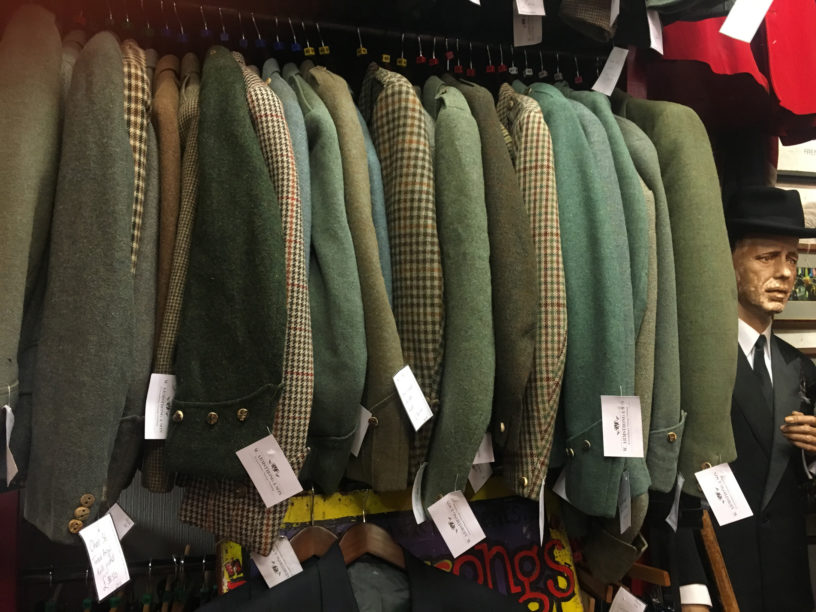
There is a saying that “the suit makes the man.” When I was finished dressing and looked at myself in the mirror, I felt complete. Finally, the inner persona I was projecting as a performer was reflected externally.
When I walked into the Royal Oak, there was a new swagger to my step. The costume signaled something, ignited the urge to communicate my queerness. Characteristic to the Oak, the regulars responded positively. The musicians gave me appreciative glances, clapped me on the shoulder like one of the lads, one even called me, “Dapper.” I felt a new confidence rise in me. A whisper tripped through my mind, this isn’t so bad. I could do this every day.
The most memorable event that night was with Lins, the barmaid. When I strode into the pub, she caught my eye and winked. I stopped, surprised and blushing. Stammering, I ordered my drink. She said to me flirtatiously, and for the first time, “Hello Darlin.” Almost taken aback that I could be desired in this form, I stammered out what my long-gone neighbor, Stormé Delarverie, used to say to me every morning in the lobby of the Chelsea Hotel.
“Well, hello honey.”
Lins handed me my drink and for a moment we paused, taking each other in. I saw that she got it. In that moment, I got her too. That is how our ritual started.
It was a Monday night, James and Linda’s session with the rest of the Auld Reekie String Band. It was close to Halloween, high tourist season. The pub was packed and I joined the other musicians on the bench. The crowd in the room made it sweltering hot. I took the jacket off, looking a little less dapper, but still feeling in character.
When it was my turn to sing, I stood up and started to belt out “Oh Death.” This time the crowd chanted with me, camera phones and video cameras appeared, a siren went off behind us oddly enhancing the melody. It was magic. I sat down and Linda slung her arm around me, “You look handsome today! Do I call you Amanda, or…?”
“Chemeche, call me Chemeche.” I picked the old nickname I had in school. A de-gendered use of my last name that always made me feel—right.
The folk scene came to an abrupt end in the March lockdowns, and with them the rhythm I’d so painstakingly crafted between daytime writer and nighttime performer. We folk singers have experienced a profound destabilization; we miss performing, but also being part of a musical community that served as a second family. Livelihoods, lifestyles, and support networks were gone in an instant.
I came back for a time to the United States during the lockdown to look after my family, and from New York I witnessed friends mourning the loss of the scene online. Sylvie, a violinist, placed flowers in the chicken wire that covers the Royal Oak’s windows, and Colin Bartie took mournful photos of its closed doors. Determined to keep the music going, Gerry Mulvenna held virtual “Captain’s Sessions” on Facebook, where we all gathered and sang.
On June 12th I flew back to my second home in Edinburgh. The folk pubs were still closed, but I moved into an apartment a stone’s throw away, biding my time, and I wasn’t alone; several other international musicians made their way back, too. We began making new music in our flats, and planning gigs as if we were playing fantasy football. Keeping faith.
Between the months of July and September, the folk scene had a brief moment of resurgence, albeit a crippled one. Music was banned in indoor venues, but players could perform outside. For a few weeks, members of the scene gathered outside the Captain’s and performed their best tunes. Daily, regulars and passers-by ringed around them, listening. It was a relief to hear music, to feel the vibrations of instruments around me again. But it was short lived. More like a brief gasp of air than a return to life.
Our last session was on September 15th and it was epic. It was as if we could feel it in the air, that the opportunity to play music was coming to a close. Everyone turned out. We played fiercely and the alleyway outside of the Captain’s was filled. It was the first and only time during the pandemic that I played a session resembling the old days. The very next day we were told that outdoor music was banned.
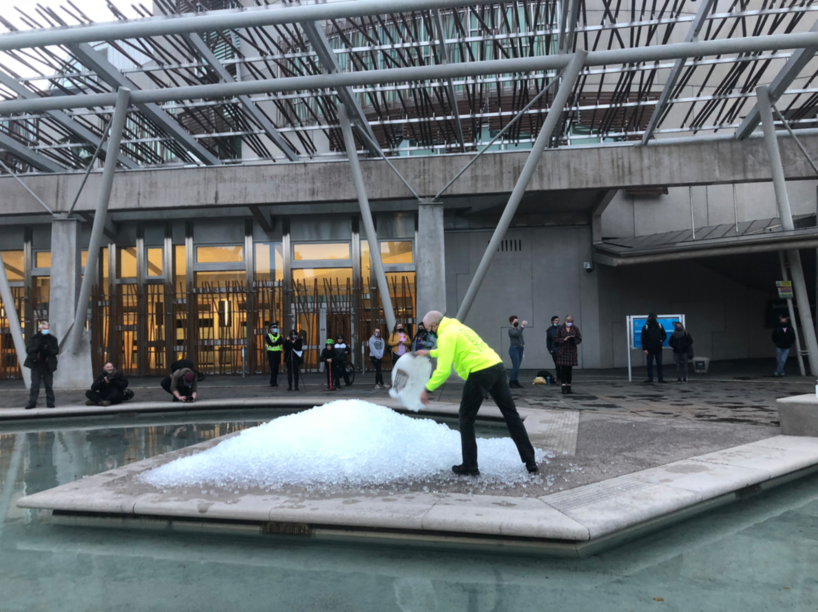
October 7th, Nicola Sturgeon, as a result of rising Covid-19 cases, announced a “circuit breaker lockdown, with all the pubs and restaurants in Scotland closed for two weeks. On October 10th, pubs from Edinburgh and Glasgow met up in front of each city’s parliament buildings and dumped their ice in front of the parliaments in protest. Ice that would go unused due to the sudden announcement of closures. I joined in this action with Pamela MacGregor, the owner of the Captain’s, along with Gerry Mulvenna, Nina Speiss, Eddy Hanson and Malcolm Hughes.
Malcolm, a veteran folk singer in his 80’s, playfully backed his wheelchair to the mound of ice, did an ollie and threw a cup of ice cubes over his shoulder onto the pile. Eddie, with the drama of a 18th-century French Revolutionary, made a powerful speech, cups of ice in each hand and, with disgust, tossed their contents onto the pile. Gerry, following his own contribution, strode to the head of line and in the cold air, played songs for the remainder of the protest.
Afterward, the musicians and pub owners reached a new level of deflation. We retreated back into our apartments, to wait for a moment that will come again.
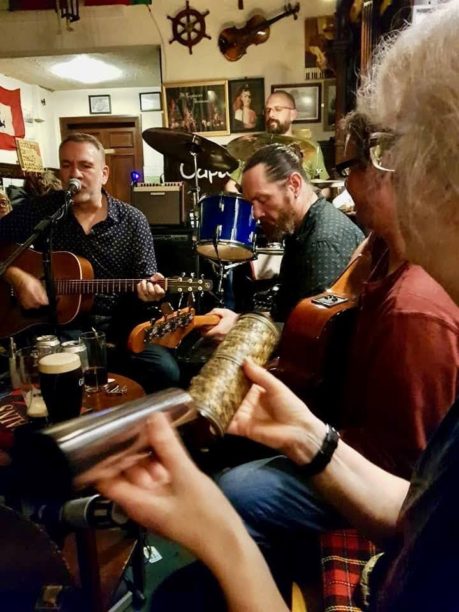
The waistcoat hugs my ribcage, flattens my breasts becomingly. The pull of my suspenders grounds me, steadying me for the night ahead. I’ve left the bottom button of my waistcoat undone, just like the Prince of Wales did. I look dapper. I like to imagine I look like a young Johnny Depp or Jack White.
It’s a Friday evening at The Royal Oak.
Ciaran McGhee standing on the bench playing a rowdy “Bonnie Banks O’ Loch Lomond” to a gleeful crowd who bounces in time with the song, singing along.
It’s going to be a long, fun night. It’s only 6pm, but the music will go on until 2am.
There is a crush of ecstatic, dancing people. For the tourists especially, this experience is unique, like something from a dream you might have about Scotland. And then there are a few relatively subdued regulars: Sylvia McGowan, Malcolm, Kevin Gore, James Stewart, Linda Larking, Toby Mottershead. They’re here to perform, to drink, and most of all, to have the craic.
Ciaran finishes his song and steps down to applause.
Kevin, well over 6 ft. tall, catches my eye and gives me a nod. Now’s the time to move. In the pause between tunes, I turn my body sideways like a blade and cut through the crowd. As I pass Kevin I give him a genial back slap and sidle up to Lins. Yesterday her hair was purple. Today it is blue. It may be pink tomorrow—a sign of the playfulness of this otherwise formidable woman. She’s tall, strong, and has a booming voice. Visitors and regulars alike don’t dare mess with her. She can cut down a fight, march the most obstinate drunk out of place with ease. Then she can delicately perch on the bench and soulfully sing “Summertime” with her ukulele.
She gives me a wink and I smile rakishly at her. We love this drill. “Hello there,” she purrs in her rich Scottish accent. And I reply:
“Well hello, honey.”

